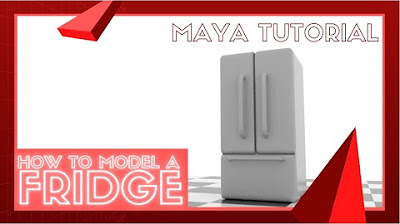Holy Cube Tutorial
Summary
TLDRThis tutorial guides viewers through the modeling of a 'holy cube' with holes on each side using Creo. It covers selecting the working directory, sketching a square, extruding the shape, and creating circular holes on the faces. The instructor demonstrates how to use the round tool to smooth edges and applies materials for a brushed aluminum finish. Finally, it explains how to render the final model, encouraging users to experiment with different effects in the rendering studio for enhanced visual appeal.
Takeaways
- 😀 Select a working directory before starting the modeling process.
- 😀 Create a new model and name it appropriately (e.g., 'holy_cube').
- 😀 Use the top plane to sketch a 30mm x 30mm square for the base of the cube.
- 😀 Extrude the square symmetrically to create a cube with a depth of 30mm.
- 😀 Sketch circles on each face of the cube to create holes with a diameter of 15mm.
- 😀 Use the extrude function to remove material through the cube for each hole.
- 😀 Apply a round tool with a 5mm radius on all edges of the cube to smooth them.
- 😀 Use a 2.5mm radius round tool on the inside edges of the holes for a polished finish.
- 😀 Apply materials (like brushed aluminum) in the render studio to enhance the cube's appearance.
- 😀 Experiment with rendering options to achieve the desired visual effect for the final model.
Q & A
What is the main objective of the tutorial?
-The main objective is to model a cube with holes that go through every side using Creo software.
What is the first step to begin modeling in Creo?
-The first step is to select your working directory and create a new model called 'holy_cube'.
How do you set the dimensions of the rectangle in the sketch?
-You use the dimension tool to set the rectangle's dimensions to 30 millimeters by 30 millimeters.
What does choosing 'symmetric' for the extrude depth accomplish?
-Choosing 'symmetric' allows the extrude to extend evenly on both sides of the sketch.
What tool is used to create the holes in the cube?
-The circle tool is used to create the circles for the holes on each face of the cube.
How is the material removed when extruding the circles?
-The 'remove material' option must be turned on to ensure the extruded circles cut through the cube.
What radius is applied to the edges of the cube, and why?
-A radius of 5 millimeters is applied to all edges of the cube to round them off, enhancing the model's appearance.
What final adjustments are made to the cube's materials in the rendering stage?
-The aluminium material's gloss is reduced to create a brushed aluminium effect.
What is the purpose of editing the scene in the render studio?
-Editing the scene allows you to change the background color and focus on the model more effectively.
How do you save the rendered image of the model?
-You select 'browse' to name your model, save it, and then press 'render' to generate the final image.
Outlines

Dieser Bereich ist nur für Premium-Benutzer verfügbar. Bitte führen Sie ein Upgrade durch, um auf diesen Abschnitt zuzugreifen.
Upgrade durchführenMindmap

Dieser Bereich ist nur für Premium-Benutzer verfügbar. Bitte führen Sie ein Upgrade durch, um auf diesen Abschnitt zuzugreifen.
Upgrade durchführenKeywords

Dieser Bereich ist nur für Premium-Benutzer verfügbar. Bitte führen Sie ein Upgrade durch, um auf diesen Abschnitt zuzugreifen.
Upgrade durchführenHighlights

Dieser Bereich ist nur für Premium-Benutzer verfügbar. Bitte führen Sie ein Upgrade durch, um auf diesen Abschnitt zuzugreifen.
Upgrade durchführenTranscripts

Dieser Bereich ist nur für Premium-Benutzer verfügbar. Bitte führen Sie ein Upgrade durch, um auf diesen Abschnitt zuzugreifen.
Upgrade durchführenWeitere ähnliche Videos ansehen

Modeling a low poly house | Blender 3.4 Tutorial

Modeling a Fridge - Maya Tutorial

Exercise 1.1 Orthographic Drawing

Blender 3.0: Anime Girl Character Series Day 3 - Upper Body Modeling [ENG Sub] | Nhij Quang

this 3D text cube interaction shouldn't be possible in framer...

FUSION 360 TUTORIAL: DESIGN THE TITAN-1M | ACADEMY
5.0 / 5 (0 votes)
